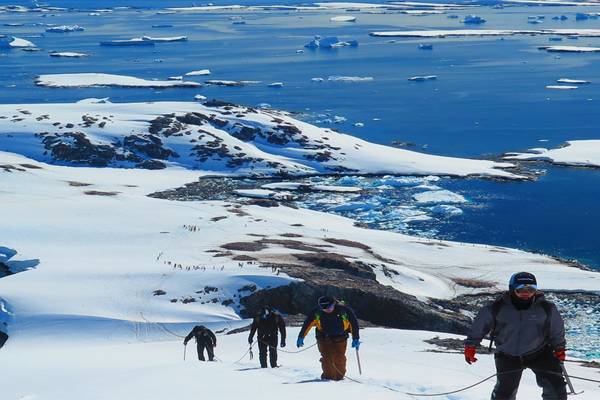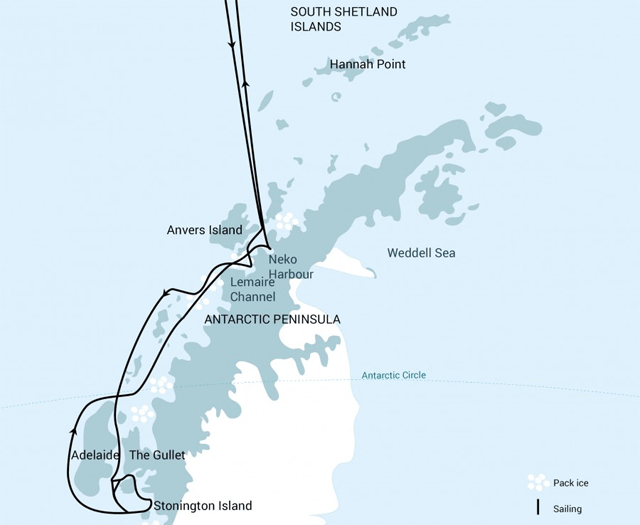HIGHLIGHTS
- Witness
dramatically different wildlife as you pass the snow-capped Melchior
Islands and Schollaert Channel, sailing between Brabant and Anvers
Islands
- Visit
the Cuverville Island, a small precipitous island nestled between the
mountains of the Antarctic Peninsula and Rongé Island.
Cuverville houses a large colony of gentoo penguins and breeding pairs
of brown skuas
- Sail
to the Neko Harbor, an epic landscape of mammoth glaciers and endless
wind-carved snow
- At
Neko Harbor, get an opportunity for a Zodiac cruise and landing with
the closest views of the surrounding alpine peaks
- On
Paradise Bay, take a Zodiac cruise in the sprawling, ice-flecked waters
before sailing to the Lemaire Channel
- Visit
Horseshoe Island, the location of the former British Base Y, a remnant
of the 1950s that is now unmanned though still equipped with almost all
the technology it had while in service
- Sail
to Stonington Island, home to the former US East Base and British Base
E, which was occupied until 1975. This island marks the southernmost
landing site of the trip – 68° south
- Enjoy
the scattered icebergs of Hanusse Baywhich offers a good chance of
spotting whales
- Near
the Antarctic Circle again, at Crystal Sound, Humpback whale sightings
are likely, and your approach to the Fish Islands offers the
possibility of a Zodiac cruise or even a landing
- Petermann
& Pléneau Islands provide a great variety of
birdlife, along with possibilities for Zodiac cruises among icebergs
that are highly popular among leopard and crabeater seals. Sight
Adélie penguins congregating among the bergs nearby, Minke
whales, humpbacks, and gentoo penguins can also be found here
DATES / RATES
Rates are listed per person
|
| Start Date | End Date | From EUR | From USD |
|---|
Rates are listed per person
|
| Start Date | End Date | From EUR | From USD |
|---|
ITINERARY
Day
1: End of the world, start of a journey
Your
voyage begins where the world drops off. Ushuaia, Argentina, reputed to
be the southernmost city on the planet, is located on the far southern
tip of South America. Starting in the afternoon, you embark from this
small resort town on Tierra del Fuego, nicknamed “The End of
the World,” and sail the mountain-fringed Beagle Channel for
the remainder of the evening.
Day
2-3: Path of the polar explorers
Over
the next two days on the Drake Passage, you enjoy some of the same
experiences encountered by the great polar explorers who first charted
these regions: cool salt breezes, rolling seas, maybe even a fin whale
spouting up sea spray. After passing the Antarctic Convergence
– Antarctica’s natural boundary, formed when
north-flowing cold waters collide with warmer sub-Antarctic seas
– you are in the circum-Antarctic upwelling zone. Not only
does the marine life change, the avian life changes too. Wandering
albatrosses, grey-headed albatrosses, black-browed albatrosses,
light-mantled sooty albatrosses, cape pigeons, southern fulmars,
Wilson’s storm petrels, blue petrels, and Antarctic petrels
are a few of the birds you might see.
Day
4-5: Entering Antarctica
Gray
stone peaks sketched with snow, towers of broken blue-white ice, and
dramatically different wildlife below and above. You first pass the
snow-capped Melchior Islands and Schollaert Channel, sailing between
Brabant and Anvers Islands.
The
intended route for you Antarctic adventure includes:
Cuverville Island
– A small precipitous island nestled between the mountains of
the Antarctic Peninsula and Rongé Island, Cuverville houses
a large colony of gentoo penguins and breeding pairs of brown skuas.
Neko Harbor
– An epic landscape of mammoth glaciers and endless
wind-carved snow, Neko Harbor offers opportunities for a Zodiac cruise
and landing that afford the closest views of the surrounding alpine
peaks.
Paradise Bay
– You could take a Zodiac cruise in these sprawling,
ice-flecked waters before sailing to the Lemaire Channel.
Day
6-8: Through the Gullet
After
a comfortable night of sailing, you wake among the many islands south
of Lemaire Channel. You are now near the Antarctic Circle. At this
point, a voyage through the aptly named Gullet – a narrow but
picturesque channel between Adelaide Island and the Antarctic Continent
is possible if the ice isn’t too dense. You can explore this
area from the prow of the ship getting the closest possible contact
with the polar terrain as you venture southward.
Along
the way, you may enjoy the following visits:
Pourquoi Pas Island
– You might circumnavigate this island, named after the ship
of the famous French explorer Jean-Baptiste Charcot. This location is
known for its tight fjords and lofty, glacier-crowded mountains.
Horseshoe Island
– This is the location of the former British Base Y, a
remnant of the 1950s that is now unmanned though still equipped with
almost all the technology it had while in service.
Stonington Island
– Home to the former US East Base and British Base E, which
was occupied until 1975, this island marks the southernmost landing
site of the trip – 68° south. If a landing here is
possible, your road turns north again afterward, through the Gunnel
Channel.
Hanusse Bay
– Enjoy the scattered icebergs of this scenic bay, which
offers a good chance of spotting whales.
Day
9-11: The whales of Crystal Sound
You
are near the Antarctic Circle again, cutting north through the
countless ice floes of Crystal Sound. Humpback whale sightings are
likely, and your approach to the Fish Islands offers the possibility of
a Zodiac cruise or even a landing. Whatever the case, the views beyond
comparison in this area. There may also be more Adélie
penguins congregating among the bergs nearby. Petermann &
Pléneau Islands provide a great variety of birdlife, along
with possibilities for Zodiac cruises among icebergs that are highly
popular among leopard and crabeater seals. Minke whales, humpbacks, and
gentoo penguins can also be found here.
Conditions
on the Drake Passage determine the exact time of departure.
Day
12-13: Familiar seas, familiar friends
Your
return voyage is far from lonely. While crossing the Drake,
you’re again greeted by the vast array of seabirds remembered
from the passage south. But they seem a little more familiar to you
now, and you to them.
Day
14: There and back again
Every
adventure, no matter how grand, must eventually come to an end.
It’s now time to disembark in Ushuaia, but with memories that
will accompany you wherever your next adventure lies.
Day
6-8: (Alternate program if the route to the south of Crystal
Sound/Hanusse Bay is blocked by ice)
You
may take a course around the western side of Adelaide Island to reach
Marguerite Bay. Should ice conditions also not allow for this approach,
you could continue the program by exploring the Antarctic Peninsula in
and around the Penola and Gerlache Straits.
 (Click image to view Ship details)
(Click image to view Ship details)
WHAT'S INCLUDED
- Voyage
aboard the indicated vessel as indicated in the itinerary
- All
meals throughout the voyage aboard the ship including snacks, coffee
and tea
- All
shore excursions and activities throughout the voyage by Zodiac
- Program
of lectures by noted naturalists and leadership by experienced
expedition staff
- Free
use of rubber boots and snowshoes
- Luggage
transfer from pick-up point to the vessel on the day of embarkation, in
Ushuaia
- Pre-scheduled
group transfer from the vessel to the airport in Ushuaia (directly
after disembarkation)
- All
miscellaneous service taxes and port charges throughout the program
- Comprehensive
pre-departure material







